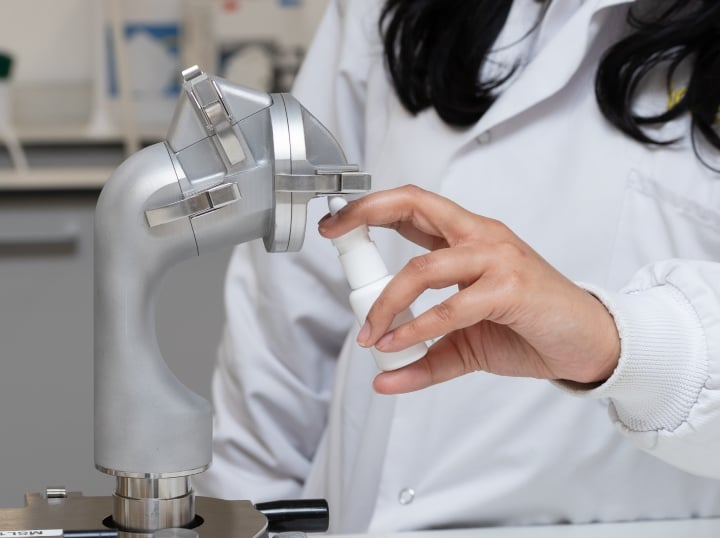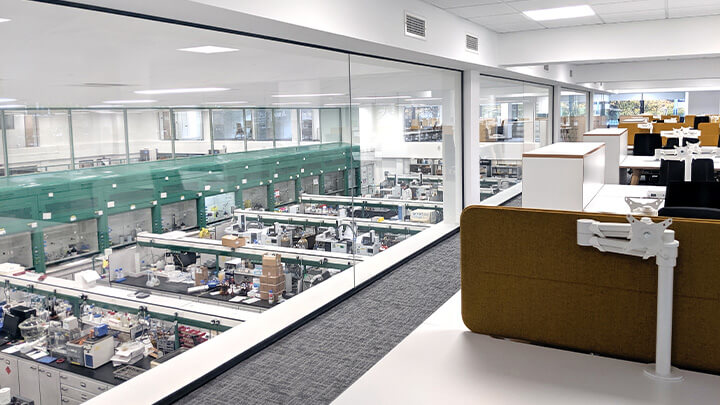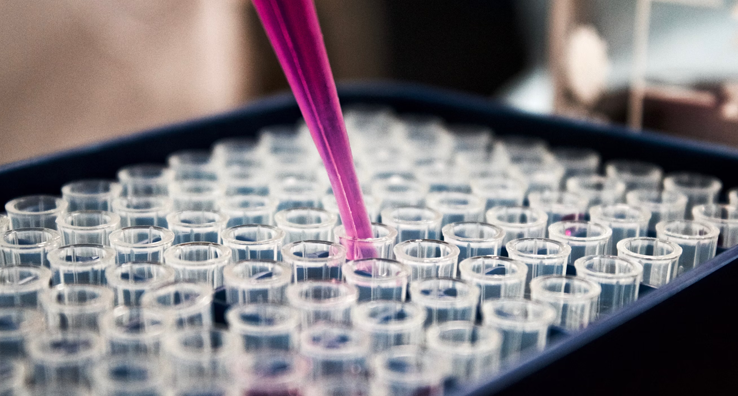Pharmaceutical particle and powder characterization services to assist understanding of physical properties to optimize formulation and production
Understanding pharmaceutical particle and powder characterization is key to efficient pharmaceutical manufacturing processes and drug products where suspensions and bulk powders are involved. Particle size and powder properties will influence bulk physical properties, such as the flowability of a pharmaceutical powder, which in turn, will impact processing, blending, tableting, dissolution, delivery and bioavailability.
During the manufacturing process, the classic challenge associated with powders, is their failure to discharge reliably from bins, hoppers or silos and poor or unpredictable flow in feeders and dosing machines. This causes unwanted interruptions in the production process, leading, potentially to unwanted shutdowns in order to correct flow restrictions and stoppages. During product development, R&D scientists aim to control and optimise dissolution or distribution of materials through refinement and adjustment of formulations and processes to produce these. The appropriate particle surface charge is important for preventing aggregation or agglomeration of particles in suspensions and emulsions and therefore impacts stability and distribution of materials in the drug product. The surface area of a solid dosage drug plays a role in its dissolution profile. When the pharmaceutical product is delivered via a device such as inhalation technology, device development challenges may be experienced related to the powder/particle or suspension properties.
Powder Characterisation Services
Our powder characterisation scientists design relevant powder rheology programs to study the flowability or “Flow Function” for your powders alongside variables such as moisture content, storage time, compressibility and surface area (BET methods) which can drive understanding about your processes and products where powders are involved and help to overcome challenges faced during product development and production. This includes problem-solving related to powder blending or caking of powders in hoppers, device/drug product compatibility, selection of materials suitable for powder processing equipment, quantifying humidity effects on powders, supporting the development of granulation methods and benchmarking and comparison of powders in terms of flowability.
Powder Characterisation Techniques:
- Powder rheology studies include assessments of consolidation, aeration, powder flow (shear rate), wall friction, compressibility, permeability, stability and variable flow rate.
- Moisture Content
- Surface Area Determination by BET
- Particle Size
- Particle Shape and Morphology
Particle Analysis Services
We deploy a range of particle analysis technology including microscopy, spectroscopy, laser scattering and solid-state characterisation techniques to determine particle properties. Particles from the nanometer range up to 3mm and bigger can be studied. Our services support pharmaceutical product development during formulation development or process development, GMP quality control, GMP lot release testing, GMP pharmaceutical stability studies and investigational manufacturing troubleshooting.
During early development, we offer tailored API material characterisation packages to determine particle shape and size distribution, surface area, porosity, moisture or solvent content, solubility, pH, solid state stability, dissolution profiles, solution stability and thermal properties (by DSC, TGA), enabling you to understand the physicochemical properties for successful formulation development. Crystal morphology capabilities include powder X-ray diffraction (XRPD) for confirmation of polymorph form.
Particle Characterisation Techniques:
- Solid state characterisation by Powder X-Ray Diffraction (XRD)
- Size distribution of particle in suspensions using Dynamic Laser Light Scattering (Zetasizer Nano)
- Particle morphology/shape, size, size distribution and shape analysis using the Laser Light Scattering (Malvern Morphologi G3 and MDRS (morphology directed Raman scattering) which will provide size and shape data for a specific class of particles, i.e. an API, within a multi-component blend or suspension
- Zetapotential of particles in suspension to improve formulation stability and shelf life and reduce formulation time and cost
- Electron microscopy (SEM, TEM) and spectroscopy with the ability to determine the elemental make-up of particles (SEM-EDX)
- Light microscopy and light obscuration testing image analysis for determination of colour, shape parameters and size. We can also perform sub-visible contamination testing directed by the pharmacopeia using this technique
- Spectroscopy techniques (FTIR, Raman, UV-vis) to determine the chemical information on a particle or bulk material level
- Confocal scanning Raman mapping and microscopy with high sensitivity and resolution to study spatially-varying chemical structures in advanced materials
- ATR-FTIR microscopy to determine chemical information through spectral data and Chemical Imaging functionality
- Thermal properties by DSC or TGA
Delivery Device Development Support
We offer integrated powder/particle characterisation with delivery device and formulation compatibility assessments with the ability (and technology) to map and characterize device/formulation performance during early-stage development in order to address problems related to device development. In particular, we have over 25 years’ experience in inhalation product or nasal drug development. We have particular expertise in drug-excipient compatibility and pharmaceutical nano-sized systems such as nano-particles or encapsulation systems as applied to drug delivery.
Particle /Powder Delivery Device Techniques:
- Wide range of pharmaceutical nanoparticle analysis approaches
- Particle characterisation from a delivery device – real-time analysis using laser diffraction
- Spray pattern and plume geometry of a liquid or liquid suspension
- Chemical identification and composition of particles delivered by a device by morphologically-directed Raman spectroscopy (MDRS, Malvern Morphologi G3-ID)
- Microscopy and spectroscopy investigations of encapsulated systems and pharmaceutical coatings (e.g. tablet coatings)
Our comprehensive range of particle and powder characterisation services can support R&D projects or be conducted within our Good Laboratory Practice (GLP) or Good Manufacturing Practice (GMP) compliant laboratories to support regulatory or submission requirements. Our scientists and regulatory experts offer Total Quality Assurance expertise through cost-effective analytical data packages which can help you bring your product to market quickly, responsibly, and economically whilst addressing or mitigating risk associated with particles or powders.

Intertek Melbourn Laboratory
GMP Pharmaceutical Analysis and Formulation Expertise
Intertek Melbourn
Saxon Way, Melbourn
Herts, SG8 6DN
UK

Intertek Pharmaceutical Services Manchester
P.O. Box 42
Hexagon Tower
Blackley
Manchester, M9 8ZS
United Kingdom
For location use: M9 8GQ

